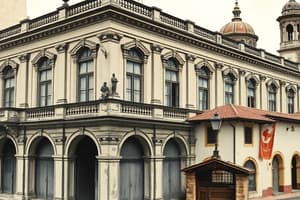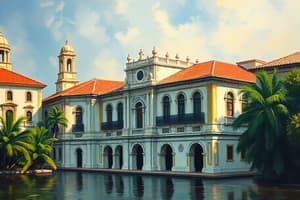Podcast
Questions and Answers
What architectural style was influenced by the reinterpretation of a foreign style by Filipinos and Chinese craftsmen?
What architectural style was influenced by the reinterpretation of a foreign style by Filipinos and Chinese craftsmen?
- Modern architecture
- Arquitectura Mestiza (correct)
- Gothic architecture
- Neoclassical architecture
Which system was primarily aimed at urbanizing the Philippines during the colonial era?
Which system was primarily aimed at urbanizing the Philippines during the colonial era?
- Curbing urban sprawl
- Reduccion and Encomienda system (correct)
- Cooperative farming model
- Feudal land ownership
What key aspect does the architecture in the Philippines respond to?
What key aspect does the architecture in the Philippines respond to?
- Global architectural trends
- Economics and trade agreements
- Historical events only
- Lifestyle, materials, and climate (correct)
The concept of anthropomorphism in architecture often includes which of the following?
The concept of anthropomorphism in architecture often includes which of the following?
What was a result of the colonial laws such as the Laws of the Indies?
What was a result of the colonial laws such as the Laws of the Indies?
Flashcards
Early Filipino Architecture
Early Filipino Architecture
Early Filipino architecture using local materials like bamboo, wood, nipa palm, and thatch. Structures included caves, lean-to shelters, and elevated houses.
Reducción System
Reducción System
A Spanish system that forced indigenous people into settlements for easier control and conversion.
Arquitectura Mestiza
Arquitectura Mestiza
A hybrid architectural style blending indigenous and Spanish elements, seen in structures like the 'Bahay na Bato'.
Bahay na Bato
Bahay na Bato
Signup and view all the flashcards
Anthropomorphism in Architecture
Anthropomorphism in Architecture
Signup and view all the flashcards
Study Notes
Early Filipino Architecture
- Early Filipino architecture was influenced by the environment and local materials
- Common forms include:
- Caves
- Lean-to shelters
- Tree houses
- Houses were elevated to prevent flooding
- Materials included:
- Bamboo
- Wood
- Nipa palm
- Thatch
Spanish Colonial Influences
- Spanish colonization significantly influenced Filipino architecture
- Major factors include:
- Reducción and Encomienda system: Spanish forced indigenous people into settlements for control
- System of cities and towns: Spanish established urban settlements with specific layouts
- Laws of the Indies: Detailed rules and regulations regarding architectural design and materials
- Colonial infrastructures: Roads, churches, and government buildings built during the colonial period
Architectural Styles
- Early Spanish colonial structures were primarily religious buildings and government offices.
- Filipinos and Chinese craftsmen integrated Spanish techniques and materials into their own styles, resulting in a unique architectural expression.
- Arquitectura Mestiza: A hybrid style that combined indigenous and Spanish elements.
- Bahay na Bato: A traditional Filipino house with stone walls and a wooden upper floor.
- Casa Grande: A Spanish colonial mansion with intricate details and a distinct layout.
Influence of Architecture
- Architecture in the Philippines reflected both functional and symbolic aspects
- Symbolism and meaning: Buildings were designed to represent power, authority, and religious beliefs.
- Anthropomorphism: Buildings often incorporated human-like features, reflecting the strong connection between people and the natural world.
Evolution of Architecture
- Reduccion: Villages were created and organized to integrate indigenous people into the Spanish system.
- Encomienda: System allocated land to Spanish colonists for labor and resources.
- Cities and towns: These organized urban environments were designed to reinforce Spanish colonial control.
Architectural Expressions
- Adaptation and Innovation: Filipinos actively responded to Spanish influence by adapting and reinterpreting colonial architectural styles, contributing to a distinctive Filipino architectural identity.
- Local Materials and Craftsmanship: Filipinos continued to use local materials and traditional craftsmanship in their architecture, resulting in unique and sustainable building practices.
Conclusion
- Spanish Colonial Influence transformed Filipino architecture, leading to a blend of indigenous and European elements.
- Architecture in the Philippines serves both functional and symbolic purposes, reflecting the rich history, culture, and adaptability of the Filipino people.
Studying That Suits You
Use AI to generate personalized quizzes and flashcards to suit your learning preferences.
Related Documents
Description
Explore the evolution of early Filipino architecture and the significant impact of Spanish colonization. This quiz covers traditional structures, materials used, and architectural styles influenced by colonial rule. Test your knowledge on how these elements shaped the built environment in the Philippines.




